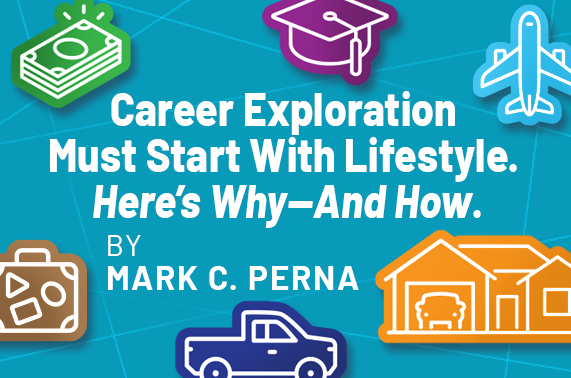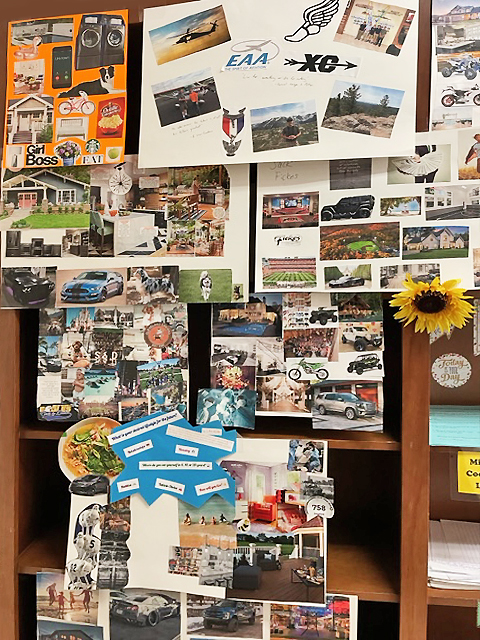
Most career exploration programs focus heavily on the different careers open to young people and the skills they need to succeed in them. And while all of this is valid, there’s one very important factor that many well-intended programs miss: lifestyle.
When you start the career conversation with lifestyle, everything changes.

Last October, I delivered a virtual presentation at Tri-County ESC in Ohio, where I stressed the importance of lifestyle in a student’s career decisions. Lifestyle goals are what motivate this generation to perform at a higher level; the career itself is often secondary.
This is an ah-ha moment for many people, one of whom was instructor Jennifer Grissinger of Hillsdale High School. “After hearing Mark speak, I really wanted to include a lifestyle lesson into my Career & College Readiness class for high school students,” she says. “The idea of lifestyle really resonated with me because I’ve taught career planning for over 20 years but I never thought to include the topic of lifestyle in it.”
Observing her own child talk about his future life confirmed for Grissinger the untapped power of lifestyle in the career conversation. “My oldest child is 15 years old and I hear him talking about his ideas for the future, how he wants to live, not knowing yet what career fields he might be interested in,” Grissinger says. “So I thought this lesson idea was worth pursuing.”
It was the beginning of a new element in Grissinger’s career planning lineup—and one that students quickly learned to enjoy.
Best Practice: Building Lifestyle Vision Boards
Grissinger was excited to bring the lifestyle conversation to her class. “We talked about what lifestyle means and brainstormed ideas together,” she says. “We discussed how lifestyle is very individualized based on each of our experiences. The students really loved it!”

In addition to lively class discussion, Grissinger created a Lifestyle Worksheet (linked here by permission) to help students think through their individual dreams and create a Lifestyle Vision Board to give it visual form.
“The students cut out pictures and even printed photos from their phones to include on their Vision Board,” she says. “Choosing pictures by looking at their own phone photos, cutting out magazine photos, or searching online was hands-on and something different.”
The written component of Grissinger’s lifestyle assignment was also a success. “They also wrote essays on what they want their future lifestyles to look like and lastly, each shared their board with the class,” she says. “It was fun and a great wrap-up activity to our Career & College unit.”
Starting the Lifestyle Conversation
As Grissinger’s class learned, a great lifestyle is defined differently by every person. To help young people crystallize their own lifestyle aspirations, it’s important to get them thinking and talking about what they want their future to look like. Here are some questions to kickstart that discussion:
- Do you want to have a family some day?
- Where do you want to live?
- Do you want to take vacations every year?
- Where would you want to go?
- What kind of cars/clothes/whatever do you want to own?
- Is there someone famous that you admire, whose lifestyle is appealing to you?
- What can’t you afford right now, that you want to be able to afford someday?
The best career conversations allow the student to uncover their own dreams for the future, rather than the adult trying to give the student a list of lifestyle “options” in the hope that one of them sounds attractive.
Then, you can take the conversation deeper through hands-on projects and presentations like the Lifestyle Vision Board. Grissinger believes her Lifestyle Vision Board is a successful best practice because it puts the student first. “Several students told me it was one of their favorite assignments because not often does a class ask them these questions about how they want to live,” she notes.
The lifestyle element will continue to figure in Grissinger’s approach to career planning. “I definitely plan to keep this lifestyle assignment for next school year, and I think I will expand on it even further.”
The possibilities for lifestyle exploration are endless and they have a major role in motivating students to increase their performance. Everyone will benefit when we make students’ lifestyle—not just their job—the focus of the career exploration process.
